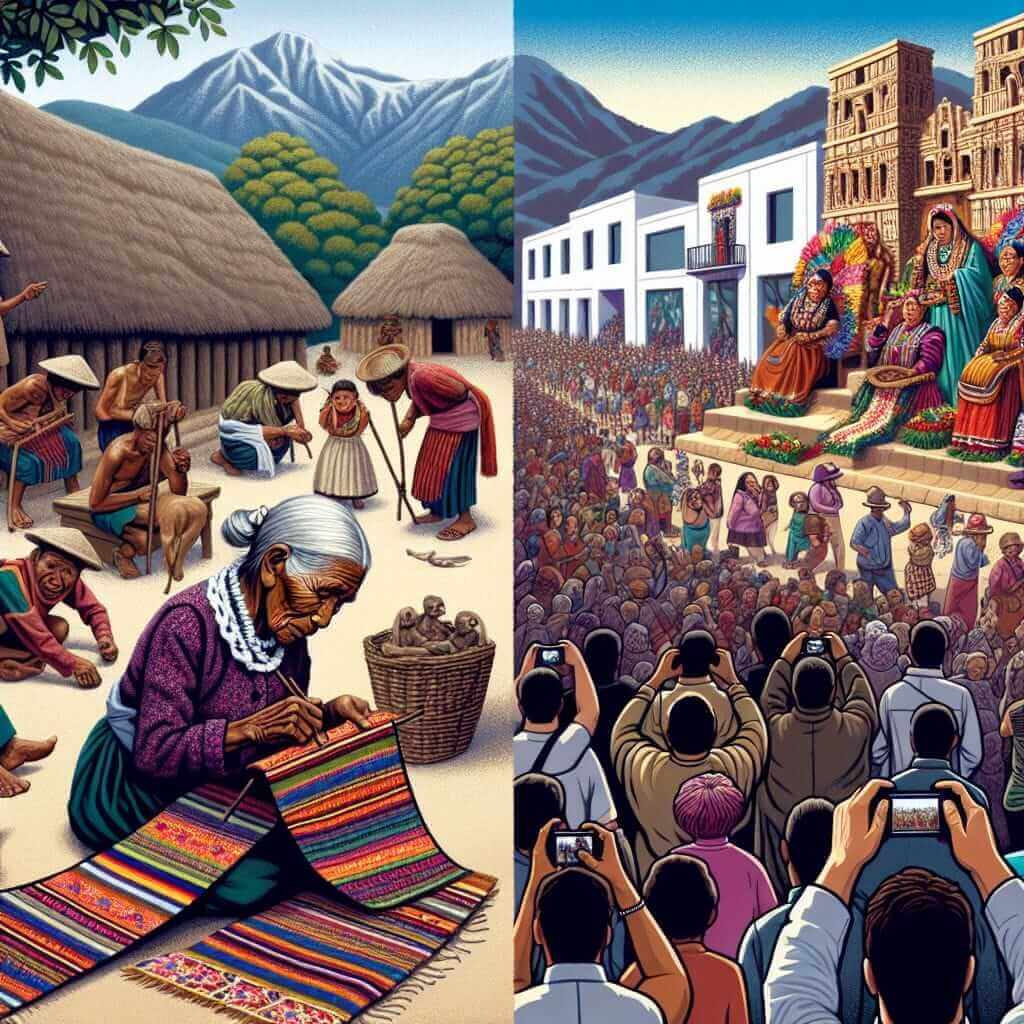The relationship between tourism and its influence on local cultures is a topic frequently appearing in the IELTS Writing Task 2 exam. This essay will delve into this complex issue, exploring both the positive and negative facets of tourism’s impact on local communities and their cultural identities. We will analyze a specific essay question, provide a band-8 model answer, and offer valuable tips, vocabulary insights, and further practice questions to empower you to excel in your IELTS writing.
Sample Essay Question
Tourism can have a significant impact on local cultures. Some people believe that this impact is negative, while others argue that it can be positive. Discuss both views and give your own opinion.
Essay Analysis
This essay question requires you to discuss both sides of an argument before presenting your own viewpoint. It’s crucial to:
- Analyze the question carefully: Identify the keywords (tourism, impact, local cultures, negative, positive) and understand the specific task (discuss both views and give your opinion).
- Structure your essay logically: A balanced approach is essential. Devote equal attention to both the positive and negative aspects of tourism’s impact on local cultures.
- Provide relevant examples: Support your arguments with concrete examples to illustrate your points effectively.
- Express a clear opinion: State your viewpoint clearly and provide reasons for your stance.
Model Essay
Tourism, a burgeoning global industry, undeniably exerts a profound influence on the cultural fabric of destinations worldwide. While some individuals contend that this impact is detrimental, others maintain that it can be beneficial. This essay will delve into both perspectives before presenting a balanced conclusion.
On the one hand, tourism can threaten the authenticity of local cultures. The influx of tourists often leads to the commercialization of traditions and customs. Local artisans may prioritize mass-produced souvenirs over traditional crafts to cater to tourist demands. For instance, in many historical cities, ancient rituals and ceremonies have been transformed into staged performances for the entertainment of visitors, thereby losing their original significance. Moreover, the desire to please tourists can lead to the adoption of foreign customs and languages, potentially eroding the uniqueness of local identities.

On the other hand, tourism can also serve as a powerful force for cultural preservation. The revenue generated from tourism can fund the restoration of historical sites and the protection of cultural heritage. For example, the Angkor Wat temple complex in Cambodia has greatly benefited from tourist dollars, which have financed extensive preservation efforts. Additionally, tourism can foster cross-cultural understanding and appreciation. By interacting with locals and experiencing their way of life, tourists can gain a deeper understanding and respect for different cultures.
In conclusion, while acknowledging the potential negative consequences of tourism on local cultures, such as cultural commodification and erosion, I firmly believe that its positive impacts outweigh the drawbacks. When managed responsibly, tourism can be a catalyst for cultural preservation, economic development, and cross-cultural exchange.
(Word count: 279)
Writing Tips
- Use topic sentences to introduce the main idea of each paragraph.
- Support your arguments with relevant examples and evidence.
- Use linking words and phrases to connect your ideas smoothly.
- Maintain a formal and academic tone throughout your essay.
- Proofread your work carefully for grammar and spelling errors.
Vocabulary Highlights
- Burgeoning: (adjective) rapidly growing or developing. (/*ˈbɜːrdʒənɪŋ/ )
- Detrimental: (adjective) causing harm or damage. ( /ˌdɛtrɪˈmɛntəl/ )
- Authenticity: (noun) the quality of being genuine or original. (/ˌɔːθɛnˈtɪsɪti/ )
- Commercialization: (noun) the process of exploiting something for profit. ( /kəˌmɜːrʃələˈzeɪʃən/ )
- Preservation: (noun) the act of maintaining something in its original state. (/ˌprɛzərˈveɪʃən/ )
- Heritage: (noun) valued objects and qualities such as historic buildings and cultural traditions. (/ˈhɛrɪtɪdʒ/ )
- Erosion: (noun) the gradual destruction or wearing away of something. (/ɪˈroʊʒən/ )
- Catalyst: (noun) something that causes a change or event to happen. (/ˈkætəlɪst/ )
Further Practice Questions
- To what extent do you agree or disagree that tourism is a threat to local cultures?
- Some people believe that governments should protect local cultures from the negative impacts of tourism. Others argue that this is not the government’s responsibility. Discuss both views and give your own opinion.
- What measures can be taken to minimize the negative impacts of tourism on local communities?
By diligently studying this guide and practicing your writing skills, you’ll be well-equipped to tackle any IELTS Writing Task 2 question related to the impact of tourism on local cultures.